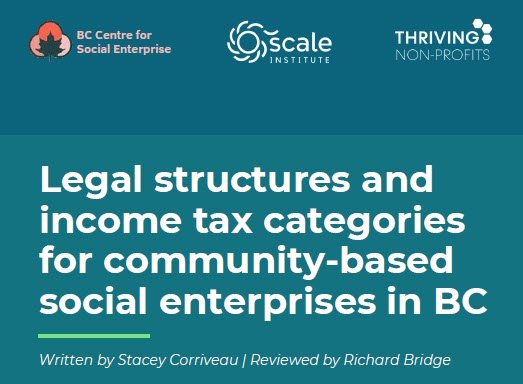Social enterprise – Do definitions matter?
It is crucial to note that ‘social enterprise’ is not defined within Canada’s Income Tax Act. There is no certification or other program to enable a venture to be officially deemed a social enterprise.
Although adopting a special legal structure is by no means required, there are two legal structures in British Columbia which have been expressly designed as ‘containers’ for social enterprise. These are the Community Contribution Company (or C3), which was introduced in 2013, and the Benefit Company, which made its debut in 2020. These may not be the best choice for all ventures, and adoption of a different legal structure than these hybrid options does not negate the activity as a social enterprise.
We embrace the Social Enterprise Council of Canada’s definition of social enterprise. Businesses that sell goods or services in the marketplace, social enterprises have a social, cultural, and/or environmental purpose; and they reinvest the majority of their profits or surplus to maximize their social mission.
Click here to view a slideshow called The Structure Shop, reviewing options for structuring a social enterprise in Canada.
Click here to view a video presentation called Social Enterprise: understanding it and moving forward, presented via the University of the Fraser Valley in Abbotsford BC, January 2021.
What’s a social enterprise?
Social enterprises are revenue-generating businesses with a twist. Whether operated by a non-profit organization or by a for-profit company, a social enterprise has two goals: to achieve social, cultural, community economic and/or environmental outcomes; and, to earn revenue.
On the surface, many social enterprises look, feel, and even operate like traditional businesses. But looking more deeply, one discovers the defining characteristics of the social enterprise: mission is at the centre of business, with income generation playing an important supporting role (from The Centre for Community Enterprise).
Are you running a social enterprise?
One test for a non-profit or charity that believes it is operating a social enterprise: what are you selling? It could be that you are operating with an entrepreneurial mindset within your organization, but if you are not selling a good or service into the marketplace, you aren’t running a business: you may be running a social program, but not a social enterprise.
And a test for a traditional business that believes it is operating a social enterprise: to what degree do social / environmental goals steer your ship? If profit is paramount (and particularly if individual owners or shareholders are personally benefitting), you may be engaging in socially conscious purchasing or corporate social responsibility, rather than operating a social enterprise.
Another possible definition: A social economy enterprise operates like a business, produces goods and services for the market, but manages its operations and redirects its surpluses in pursuit of social and environmental goals. (from Western Economic Diversification).
A goal of some social enterprises (aside from generating revenues to pursue a mission) is the training and/or employment of people who are typically excluded from the mainstream economy, thus creating capacity and self-sufficiency for individuals, and impacting their communities and lessening reliance on the social safety net. These ventures are sometimes referred to as Work Integrated Social Enterprises (or WISE’s).
Some complementary definitions:
- Social enterprise applies an entrepreneurial approach to addressing social issues and creating positive community change.
- A social enterprise is a business that uses entrepreneurial methods to accomplish social goals and/or feed profits to a parent charity or non-profit to enable it to fulfill more of its own social mission.
- A social enterprise is a revenue-generating business with primarily social objectives whose surpluses are reinvested for that purpose in the business or in the community, rather than being driven by the need to deliver profit to shareholders and owners.
LATEST NEWS & PUBLICATIONS
Prepare for impact: legal structures and income tax categories eBook
Do you operate a social enterprise in BC? Or [...]
Free GrantScan resource assists Canadian organizations to access unrestricted grants and funding for operations, administration, overhead, and capacity building
We’re pleased to share news about a resource for accessing [...]
The Canadian Social Enterprise Directory is now live — add your free listing
A new, searchable online directory of Canadian social enterprises is [...]



